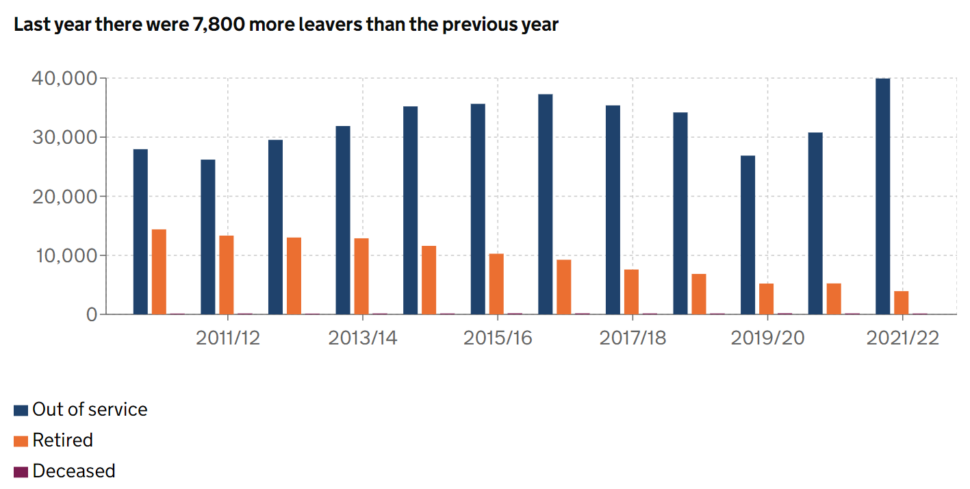The rate of teachers leaving the state sector for reasons other than retirement grew to a record high last year, with nearly 40,000 departures.
New school workforce data, published today, shows that 39,930 teachers (8.8 per cent of the sector) left state schools in the 2021-22 academic year, up 7,800 on the previous year when 6.9 per cent left.
This is the highest since data for the recent records from the 2010-11 census began.
When you include those who retired or died, the overall number of leavers was 43,997 – meaning 9.7 per cent of the teaching workforce left last year.
However the number of retirees fell to 3,929 (0.9 per cent) last year, down from 5,237 (1.2 per cent) in 2021-22 and a high of 14,387 (3.4 per cent) in 2010-11.
It means the overall leaver rate for this year is the highest since 2017-18.
Jack Worth, school workforce lead at the National Foundation for Educational Research (NFER), described the figures as “hugely concerning”.
“The overall picture is that teacher leaving rates rose in 2022 to just above the pre-pandemic level amid a competitive wider labour market,” he added.
“Addressing teacher retention should be at the heart of dealing with the teacher supply challenge, with further policy action needed to reduce teacher workload and increase the competitiveness of teacher pay.”
Heads quit at highest ever rate
A total of 2,341 heads left the state sector last year through either retirement or quitting (10.6 per cent) – the highest rate since 2016-17, which was also 10.6 per cent.
But of these, 1,694 left for reasons other than retirement (7.7 per cent) – up from 1,151 (5.2 per cent) the year before and the highest on record.
This year was only the third time since 2010 more than 1,000 heads have quit for reasons other than retirement.
More than double the number of heads quit last year compared to 2015-16.
Geoff Barton, general secretary of leaders’ union ASCL, said: “We cannot go on like this. Leaders, teachers, children and parents all deserve better from the government than complacency and neglect.”
DfE celebrates record number of teachers
The data shows a record high number of teachers in England’s schools- 468,371 – in 2022-23, an increase of 2,800 compared to last year.
This is also over 27,000 more teachers than in 2010, a rise of 6 per cent. However there has been an 11 per cent rise in pupil numbers during this time.
The government has actually missed its secondary teacher recruitment targets for nine of the past ten years.
New research published yesterday showed leaders describing a “weak or absent field” of candidates at interviews and of teachers reporting temporary or unqualified cover in classrooms.

Today’s figures also present a worsening picture on retention.
Among newly-qualified teachers, 12.8 per cent are now leaving a year after qualifying, compared to 12.5 per cent the year before.
The percentage leaving after two years grew from 17.3 to 19.9 per cent.
Vacancies for both full and part-time roles doubled in the two years to November 2022, the DfE data shows.
The rate also increased, from two in 1,000 teachers to five in 1,000, meaning that the number of empty roles was only partially offset by an increase in the overall school workforce.
The number of supply teachers in post also rose, from 1,800 in November 2020 to 3,000 in November 2022.
This is a rate of eight posts per 1,000, compared with five posts per 1,000 two years before.
Education secretary Gillian Keegan said: “In today’s competitive job market, it is fantastic to see so many people choosing a rewarding teaching career, with a record number of teachers now working in our schools.
“We know there is more to do, which is why we have generous bursaries to attract new trainees to teach priority subjects and focusing on supporting new teachers from the very start of their journey with free, high-quality, ongoing professional development.”
















This is a powerful issue which requires serious systematic changes, the kind that too many education officials are afraid to take:
1. Increase pay
2. Significantly reducing class size
3. Provide time to polish, prepare and reflect
4. Make significant provisions to teach and learn
5. Make time for robust professional learning
6. Reduce the volume of expectations
7. Trust teacher’s capacity to assess students
8. Respect and recognize teacher insight, action and creativity
9. Provides teacher supports
10. Coordinate meaningful mentorship and performance appraisal
11. Ensure authentic family communication and interaction
12. Provide ample access to resources
13. Create stunning and stimulating spaces
14. Provide ample teacher leadership opportunities
15. Ensure quality health & safety conditions
In the new book, Teachers Shortages and the Challenge of Retention: Practices that Make School Systems and Cultures More Attractive and Empowering, Smith (2023) notes that it not about picking some of the above-mentioned changes, but about making them all happen. When this can be done, there should be significant changes in teacher shortages and greater demand to be a teaching professional.
Teacher recruitment and retention has been a problem for many years, possibly decades. The signs were there even when joined the profession in 2002. Constant denigration, blame, criticism, low pay, excessive workload, unruly and very disrespectful students, career stagnation, and bullying among others does not make teaching an attractive profession for new teachers and pushes away experienced teachers. Something needs to be done urgently to arrest the recruitment and retention crises before it is too late.
A major part of the problem is due to an acute shortage of competent compassionate leadership. Many in education leadership and management are bereft of requisite knowledge, skills, and understanding about education, cognitive science and the learning process. Most damaging of all is they lack human empathy. As a consequence they are blind and mute to the critical and diverse roles beyond just teaching that teachers play in the educational ecosystem, successful learning outcomes, and the health of society as a whole. The wellbeing of teachers is inextricably linked to the wellbeing of students and their education (academic achievement and holistic development), and society.
The inability of successive governments to address the problem once and for all reflects a clear lack of commitment, willingness, capacity, and competence. In essence no one has thought it necessary to ask the fundamental questions WHY is teacher recruitment such a problem and WHY is there a high rate of teacher attrition? Failure to ask these questions shows that no one in government actually cares. And you do not need constitute a panel to arrive at meaningful solutions.
Cash inducements will not solve the teacher recruitment and retention crises. Below are some of the factors I feel are directly or indirectly responsible for teacher shortages in schools (secondary in particular).
1. Here-today-gone-tomorrow government interference: endless raft of initiatives, meddling with school curricula, changing education policy with every new minister of education many/most of who do not have a background in education and were last in a classroom when they sat their GCSE.
2. Schemes of Work and Curriculum: ditto 1.
3. Teacher Wellbeing (or lack of): ditto 1 – 30
4. Lack of human and material resources
5. School Day
6. Lesson Schedule and Timings
7. Delivery of lessons: (over prescriptive hence restrictive) upload, offload, reload, download, platforms, programs, videos, worksheets etc meanwhile foundational learning skills – basic literacy, numeracy, reading, writing, and attention span, executive function skills – are declining as fast as technology is expanding and being embraced.
8. Student Wellbeing (or lack of): ditto 9, 27, 30
9. Students’ negative attitude and laziness towards learning (passing exams): ditto 27
10. Government Policy: ditto 1.
11. Hidden Curriculum: ditto 1.
12. Very incompetent and ineffective school leadership and management
13. School operations – ineffective deployment of inadequate human resources: ditto 12
14. Socio-cultural influences: Ofsted; ditto 1, 11
15. School culture: ditto 12
16. Total lack of discipline and respect for teachers: Unruly disrespectful behaviour of students, parents: Society giving the impression that students’ learning is of particular benefit to teachers and that students have an entitlement regardless of how rude, disruptive and violent they are towards teachers
17. Undervalue and constant (overt and covert) denigration of teachers and the teaching profession
18. Low pay
19. Bullying of teachers: ditto 12; and head teachers/principals: ditto 14
20. Incompetent teachers on becoming senior leaders or head teachers and principals acting like tin gods
21. Teacher workload: ditto 1-30
22. Introducing into teaching every fad by every self-proclaimed expert from every other profession
23. Lack of teacher support
24. Expectation that every teacher MUST also be proficient jack of all trades: IT and technology expert, data analyst, examiner, marker, futurist, assessment specialist, curriculum developer, strategist, researcher, child psychologists, instructor, multi-linguist, EAL specialist, SEND specialist, guardian or parent (even if you do not have a child of your own), encyclopaedia, role model, mentor, communicator, lesson planner, pedagogue, diplomat, gifted and talented genius, organiser, advisor, counsellor, email vanguard, PG and PD student, letter writer, time keeper, first aid specialist, break-time supervisor, end-of-school usher, child monitor, psychic, comedian, actor/actress/, UN peace-maker/peace-keeper, translator, photocopier, telephone receptionist, child-minder/baby-sitter, social worker, behaviour specialist, prison warden, police officer, psychiatrist, mental health specialist, attendance officer, administrative officers, psychologist, zoo keeper, nurse, cover supervisor, learning facilitator, and of course scapegoat.
25. Cronyism, nepotism, favouritism and prejudice of inept principals and head teachers towards their servile favourite teachers promotes sycophancy
26. Career stagnation
27. Over-testing of students/focus on certification rather than education: ditto 8
28. Marketisation of education
29. Endless and mostly useless PD
30. Technology/Social media/Instagram/TikTok/anything for attention syndrome etc
No one goes into a profession to be insulted, assaulted, abused, disrespected, denigrated, bullied, oppressed, harassed, humiliated, or underpaid. But this is the daily experience of many teachers. Indeed, teaching in the UK is a form of modern slavery.
From the above listed issues it is obvious that financial inducements and/or hike in salary alone will not solve the problem of attracting more committed people into the teaching profession, nor stop highly experienced others from leaving.
I have left education and teaching due to the above and disillusionment, lack of opportunity, and career stagnation.
In my opinion, the education system needs a complete overhaul by those who actually know what education is all about.
Anyone who truly cares about the education of our children and the future of our society should please read the following books:
1. Good Education by I. Pritchard
2. Who Cares About Education?…going in the wrong by E. Macfarlane
3. How We Learn: The New Science of Education and the Brain by S. Dehaene
4. Why Do I Need A Teacher When I’ve Got Google by I. Gilbert
5. The Nine Pillars Of Great Schools by D. Woods, R. Macfarlane, D. McBeath
6. An Intelligent Person’s Guide To Education by T. Little
Well said. I cannot emphasise how you truly captured the reality of the profession not to mention the endless list of skills you provided that demonstrate the wealth of transferrable skills teachers possess in case they decide to embarking a career change. Thank you.
Thanks for your post Patrick, it’s such a refreshing change reading this from someone who’s describing the real face of teaching. I left teaching just over four years ago now after 23 years of service because of excessive and unmanageable workloads. The root cause of all these issues you have brilliantly explained is simple as is the solution! If any teachers looks at their contracts of employment they will notice that their working hours (start time and finish time) are not on there, so what I hear you ask!
What this means is that you are employed by private companies (academies) on the basis of them having an unlimited amount of free overtime. Any organisation whether this is a bank, supermarket, sport centre, warehouse, school etc that employs people on this basis is going to abuse it and this is exactly what is happening to teachers. The solution is simple, teachers contracts need to change, they need to have the start and finish times on them just like in any other job e.g. 8am to 5pm weekdays. Whether you are new to the profession or a veteran, If like me you are presented with one of these unlimited amount of free overtime contracts (UAOFOC) DO NOT SIGN THEM!!! Hand them back, tell the organisation that “I’m really sorry but my working hours are not on this contract please can you give me one with the working hours on it.” If you then you get the usual reaction of ridicule like I do simply hand it back and walk away!
This is the only way we are going to stop the “prawn sandwich brigade” (Roy Keane 2001) who are running a muck in the education system dead in their tracks.
One of the biggest issues is bullying in the workplace (headteachers, executive heads). This isn’t being spoken about enough. I know of so many excellent practitioners leaving the profession because of this and there isn’t a way of addressing it without it becoming toxic at work so people just leave.
I am working mainly as a supply teacher and while I pay my rent I get to see how grim the situation is. I could never teach full time and find that teachers has no voice inside a classroom, in school and in society. The abuse we take on a daily basis is ignored. No wonder many leave. It is time to go back to basics (it’s all ppt…) and give teachers more autonomy. The structure of the lesson is not apt for teaching (starter, activities, plenaries and all in electronic form) and it is absurd to think it’s a fit for all teachers. We also need to prepare kids for life out there. I know teachers that do everything for the kids. We are not creating independent human beings at all. Promote independence….right